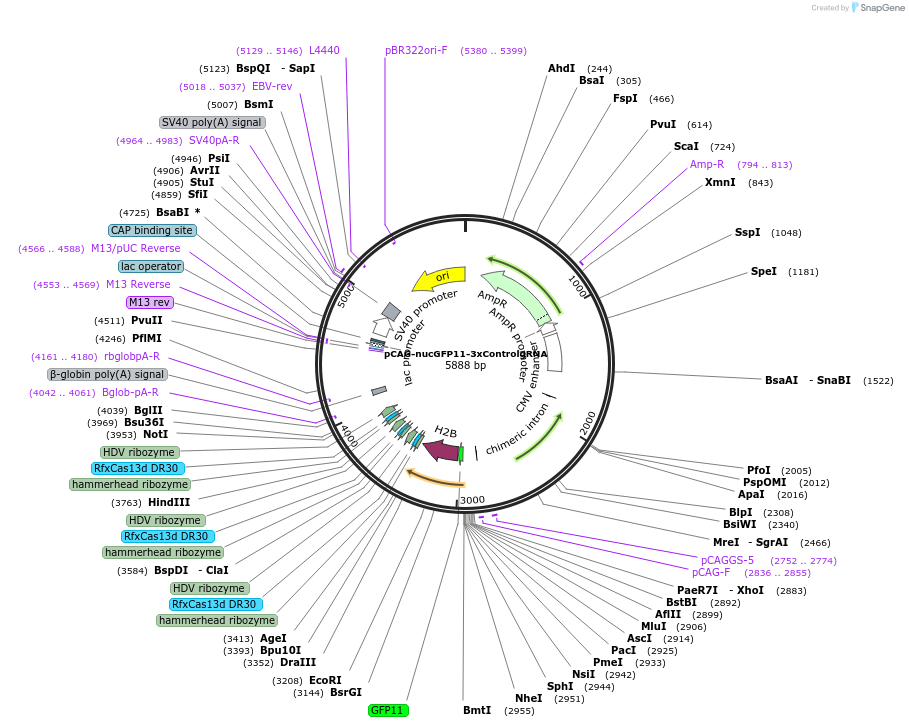pCAG-nucGFP11-3xControlgRNA
(Plasmid
#224568)
-
PurposeUbiquitous expression plasmid, CAG promoter (CMV immediate early enhancer and chicken beta actin promoter), three Control gRNAs with ribozyme self-cleavage sites, and nuclear split GFP(11) reporter.
-
Depositing Lab
-
Sequence Information
Ordering
| Item | Catalog # | Description | Quantity | Price (USD) | |
|---|---|---|---|---|---|
| Plasmid | 224568 | Standard format: Plasmid sent in bacteria as agar stab | 1 | $89 | |
Backbone
-
Vector backbonepCAG-memRFP
-
Modifications to backboneGuide RNAs inserted following memRFP, GFP11-H2B inserted in place of memRFP
-
Vector typeCRISPR
Growth in Bacteria
-
Bacterial Resistance(s)Ampicillin, 100 μg/mL
-
Growth Temperature37°C
-
Growth Strain(s)DH5alpha
-
Copy numberHigh Copy
Gene/Insert
-
Gene/Insert nameGFP11-H2B
-
Alt namesplit GFP 11
-
gRNA/shRNA sequenceaacccctaccaactggtcggggtttgaaacctcttacctcagttacaatttat
-
MutationCodon optimized
-
GenBank ID
-
Tag
/ Fusion Protein
- Histone H2B (nuclear localization) (C terminal on insert)
Cloning Information
- Cloning method Restriction Enzyme
- 5′ cloning site NheI (not destroyed)
- 3′ cloning site NotI (not destroyed)
- 5′ sequencing primer tacagctcctgggcaacgtg
- (Common Sequencing Primers)
Resource Information
-
Supplemental Documents
Terms and Licenses
-
Academic/Nonprofit Terms
-
Industry Terms
- Not Available to Industry
Trademarks:
- Zeocin® is an InvivoGen trademark.
These plasmids were created by your colleagues. Please acknowledge the Principal Investigator, cite the article in which the plasmids were described, and include Addgene in the Materials and Methods of your future publications.
-
For your Materials & Methods section:
pCAG-nucGFP11-3xControlgRNA was a gift from Erica Hutchins (Addgene plasmid # 224568 ; http://n2t.net/addgene:224568 ; RRID:Addgene_224568) -
For your References section:
CRISPR-Cas13d as a molecular tool to achieve targeted gene expression knockdown in chick embryos. Kim M, Hutchins EJ. Dev Biol. 2024 Nov 30:S0012-1606(24)00265-3. doi: 10.1016/j.ydbio.2024.11.013. 10.1016/j.ydbio.2024.11.013 PubMed 39622311







